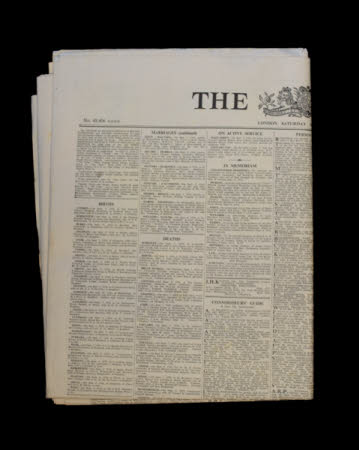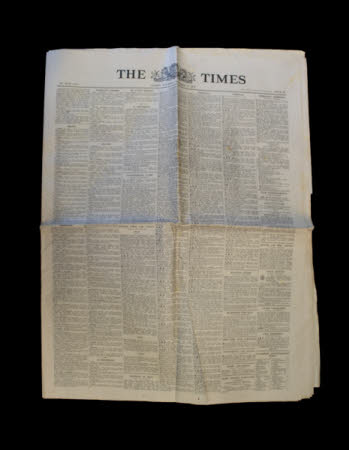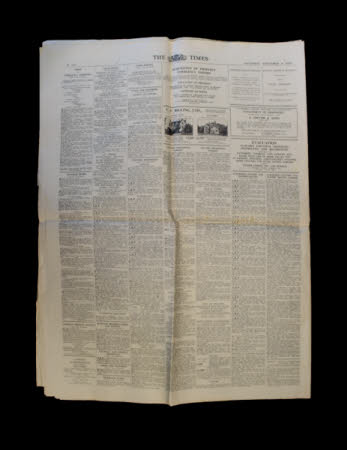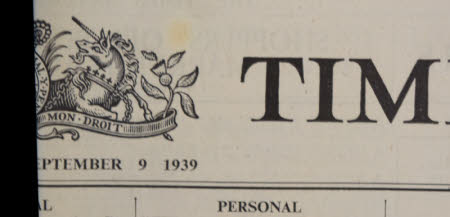The Times
The Times
Category
Books
Date
9 Sep 1939
Materials
Newspaper
Measurements
327 x 260 x 8 mm
Order this imageCollection
Mr Straw's House, Nottinghamshire
NT 748899.8
Summary
The sixth in a sequence of whole newspapers, The Times 'SATURDAY SEPTEMBER 9 1939'. The top sheet as the papers are wrapped has a series of advertisements, 'PERSONAL', 'PERSONAL' and 'EMERGENCY ADRESSES' alongside others. The newspapers in the package are; Daily Mail 26 May 1949 (wrapping) Daily Mail 30 July 1941 (scraps) The Times 4 September 1939 The Times 5 September 1939 The Times 6 September 1939 The Times 7 September 1939 The Times 8 September 1939 The Times 9 September 1939 Worksop Guardian 17 May 1940. Friday 1 September 1939 at 0445 hours German forces invade Poland without a declaration of war. The operation is code named Fall Weiss (Plan White). The Germans allot 52 divisions for the invasion (some 1.5 million men), including the 6 armoured divisions and all their motorized units. Of the divisions left to defend against an Anglo-French front, only about 10 are regarded by the Germans as being fit for any kind of action. In London the British government demands a German withdrawal from Poland. Because of the fear of air attacks, the evacuation of young children from London and other supposedly vulnerable areas is begun. General mobilization is proclaimed. (The Royal Navy was mobilized on August 31st.) Air Raid Precautions (ARP) are introduced and a "blackout" enforced from sunset. British railways are taken under government control. Saturday 9 September 1939 Poles counterattack along Bzura, the German 4th Panzer Division, part of the German 16th Panzer Corps, mounts an attack in the southeast suburbs of Warsaw but is beaten off. The German command believes that almost all the Polish forces have retired east of the Vistula River but in fact fresh units from the Poznan Army and part of the Pomorze Army have joined together around Kutno. About 10 Polish divisions are assembling in this area under the command of General Tadeusz Kutrzeba. They now begin a counterattack over the Bzura River against the German 8th Army. The battles which follow will be the hardest fought of the campaign. Initially, the Poles gain some success. On the Western Front French troops advance into the Warndt Forest across the German border and occupy 3 square miles of German territory. The action is widely viewed as having more propaganda than military purpose since the region, referred to by the French as "occupied Germany," is deserted, heavily mined and booby-trapped. In France the last of 13 RAF squadrons arrives in move begun on September 4th to strengthen the British Expeditionary Force. From Berlin Goring threatens reprisals against Britain if the RAF bombs Germany and boasts that Berlin will never be subjected to enemy aerial attack. He says that "the Polish Army will never emerge again from the German embrace." Ribbentrop invites the Soviets to advance to their new common frontier, the Narew, Vistula and San rivers (the Bug and Pissa would eventually replace the Vistula to avoid a divided Warsaw.
Provenance
Straw collection bequeathed to the National Trust on the death in 1990 of William Straw.
Makers and roles
The Times, printer and publisher



